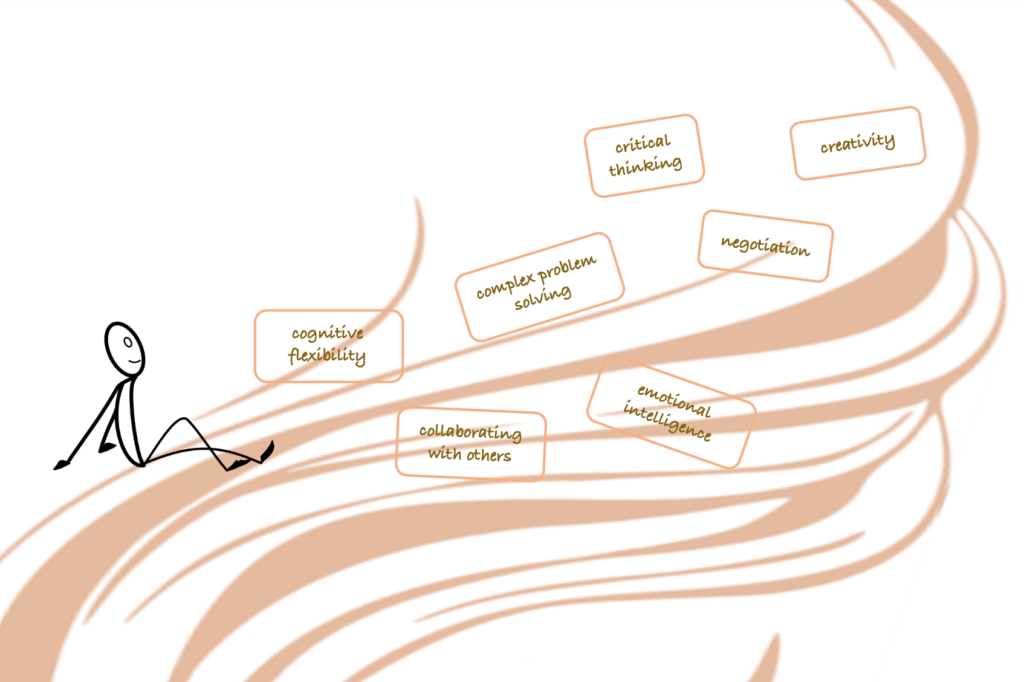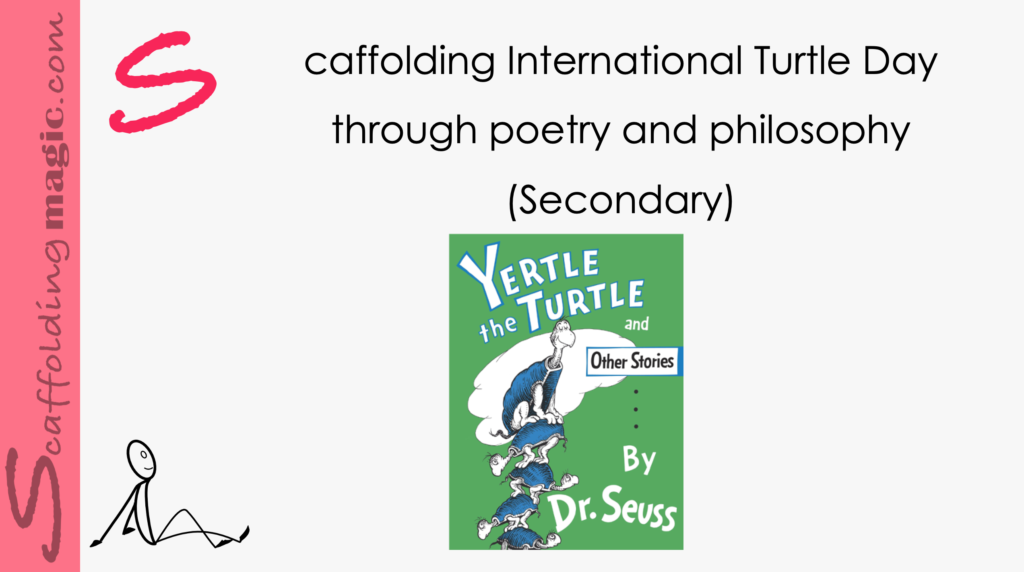You caught a beauty!!!
Download PDF of scaffold here.
theory behind scaffold…
May 23 – International Turtle Day. Go ahead, get it over with….have a good laugh….then keep reading! The more we know about these amazing creatures and the literary connections they inspire, the more we realise that this day gives us the opportunity to highlight a much larger issue:
how we treat all living beings on the planet.
Let’s approach this really interesting choice of an international day through poetry and let’s go a little further – let’s throw in philosophy to boot.
Where to begin?…well, with the obvious.
TURTLES = DR. SEUS (Yertle the Turtle)
Seriously? A children’s book about turtles is philosophical? Oh yes it is! Theodor Seuss Geisel (Dr. Seuss), was not just a writer of children’Exploring poetry and philosophy through the lens of a children’s book author who was passionate about young learners becoming thoughtful.s books, but a profound philosopher, a poet, a political advocate (sometimes controversial), and a promoter of critical thinking on all levels. Not bad, eh?!
Outlining his many talents, we will also understand how many opportunities this day gives us to …………………………….
Theodor Seuss Geisel’s many hats…
- a children’s book writer…he was a…………………………..author, political cartoonist, illustrator, poet, animator, and filmmaker. He is best known for more than 60 children’s books that he wrote and illustrated under the pseudonym ‘Dr. Seuss’.
- a poet…he wrote most of his books i……………………………………………encourage musical rhythm as the lines are composed with two weak syllables followed by one strong syllable.
An example of anapestic tetrameter from Yertle the Turtle:
And today the Great Yertle, that Marvelous he
Is King of the Mud. That is all he can see
Geisel’s books are ideal for teaching children other poetic meters such as ………………………………………………………Your students will have visual, linguistic, rhythmic and creative stimulation all at once. (You can find a specific poetic analysis for Yertle the Turtle at this site.)
- a philosopher…he had a moral message in all of his stories, but intentionally did not highlight them. ………………………………………………. subconsciously. (You can find out more about the importance of philosophic development at young ages at this site.)
- a political activist…not all of his books were written with a political message, but many were. Yertle the Turtle, for instance, was a statement about overreaching and poking fun at despots. In fact, it is little known that the original drawing of Yertle i……………………………………………….maybe all creatures should be’, can be applied to sentiments largely felt toward historic as well as current dictators and their like vying for subservience from others.
step by step…
This scaffold uses Dr. Seuss’ classic book and a form of the game ‘Telephone’ as an introduction to the reading of the book and then extended into the basis for any project-based lesson you’re about to begin, including lessons on natural sciences.
- Copy and paste several lines of Yertle the Turtle, in a document or in a PPT.
- Print the sentences out, make a set of them for each group of students, cut them up, crumple them up and put them in different bags. Hand them out to the students.
- The activity proceeds in the following manner:
- One student in the group chooses a sentence from the bag and reads it silently
- That student then …………………………………………………second student in the group.
- The second student is ……………………………………………………….to the next group member.
- This continues until the last group member has heard the sentence and then ………………………………to the group.
- The student who initially read the sentence reads it aloud and everyone ……………………………………..
- Another student chooses a sentence from the bag, reads it silently, and begins the same dynamic as before.
- W……………………………………………………..larify any questions about concept or linguistics.
- Formative Assessment: Write the funniest mistakes your group has made ………………………………… game.
- Reflection: After reading the story, students ………………………………………………….
Philosophical questions they can answer:
- How important is fairness in a society?
- Should every individual have equal rights? If so, what should they be?
- What are the responsibilities included in owning something?
- How can we resolve conflicts in which ………………………………………………..?
- What are characteristics of a leader ………………………………….?
- Is disliking a leader sufficient to …………………………………….?
(More philosophical questions included below.)
- Extension: Watch the video of Yertle the Turtle and discuss the hierarchy highlighted in the story, and whether that dynamic is just or not. Where can students find a similar hierarchy in their own lives?
Example of sentences from a transcript you can use for the activity:
- Sentence 1:
- …………………………………………………………………king of the pond.
- Sentence 2:
- A nice little pond. It was clean. It was neat. The water was warm. There was plenty to eat.
- Sentence 3:
- The turtles had everything turtles might ………………………………..eed.
- Extensions:
- Video: Yertle the Turtle
- Video: The Real World of Turtles
More Questions for Philosophical Discussion
TOPIC 1: Justice and Rights
The sentence from the book this ideology comes from: Mack protests that Yertle’s treatment of the turtles is unfair.
- Have you ever felt like someone with power was treating you or someone you knew unfairly?
- Is Mack right that Yertle is treating the turtles unfairly? Why?
- What does fairness mean?
- Can you think of a time when the best thing to do isn’t fair?
- Is just being fair enough to make a society good? What if all the turtles were equally hungry and unhappy?
- Do the turtles deserve to be free? Do they have other rights?
- Is Yertle a bad king for making the turtles be his throne?
- Is it ever okay for a leader to allow his subjects to be hurt or treated unfairly?
- Do the turtles have a right to say no to Yertle, even though he is in charge?
- What rights do you think all people should have? Are there times when people should not have these rights?
TOPIC 2: Property and Colonialism
The sentence from the book this ideology comes from: Yertle thinks that if he sees something, he rules over it.
- Do you own everything that you see?
- W……………………………………… because you saw it?
- Is Yertle really the ruler of all that he sees? Why or why not?
- Who really owns the house that Yertle ………………………………?
- How do people get to own things? How do people …………………………………….?
- Have you ever disagreed with a friend about …………………………………………………? How did you resolve the conflict?
- Is it ever okay for a person to t…………………………………………………………………………. someone else?
- Indigenous peoples were living here before Europeans came and took their land. Did the European settlers really own it?
- Do we, their descendants, own that same land we live on now?
TOPIC 3: Power and Authority
The sentence from the book this ideology comes from: The turtles obey Yertle’s commands despite being afraid and uncomfortable.
- Who are some people in charge of you?
- Do you always listen to them?
- Should you listen to ………………….?
- If you were …………., would you have obeyed Yertle’s commands?
- Can you think of times …………………………………. people in charge?
- Why do you think that …………………………s listened to …………………….even though they didn’t want to do what he told them?
- Should people listen to a person in charge even if they don’t like them?
- If ………………………………………………….., should that leader’s rule be obeyed?
- Can you think of leaders that should be followed and leaders that should not be? Why do you think they should ……………………………?
Original questions and guidelines for philosophical discussion by Teddy Willard and Soren Schlassa archived here. Edited June 2020 by The Janet Prindle Institute for Ethics. Find tips for leading a philosophical discussion on the Resources page.


Scaffoldingmagic.com is your entryway into DYNAMIC bilingual learning methodologies, such as Phenomenon-Based Learning, CLIL, EMI, and ESL. You’ll find ways to implement critical thinking tools (DOK) to promote higher level thinking, the growth mindset, instill an ethic of excellence, deep reflection on learning, and all through multi-cultural, interdisciplinary activities. We have the keys to turning competences into action and to creating collective efficacy in your school so you move ahead as a unified, enthusiastic team.



